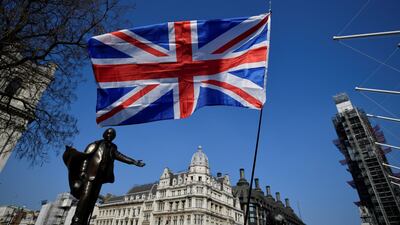The UK is interested in negotiating a free trade agreement with the GCC once it completes the Brexit process as it seeks to capitalise on the growth potential with the six-member economic bloc, a UK minister said.
"When we look at the GCC … we have started building our relationship more dramatically in the last few years," Baroness Rona Fairhead CBE, UK Minister of State for Trade and Export Promotion told The National in Dubai on Sunday.
“In the future, is there a potential for a free trade agreement between the GCC and the UK: absolutely.”
The UK, which is in the process of exiting the European Union, is looking to negotiate independent deals with countries and economic blocs around the world to boost its exports beyond the eurozone, which the minister said accounts for about 46 to 48 per cent of the UK’s trade.
A trade deal with the UAE, the second-biggest Arab economy after Saudi Arabia, could take years, the UAE Minister of Economy Sultan Al Mansouri told the Government Summit in Dubai in February. The UAE has already been approached by the UK about a post-Brexit trade deal, he noted at the time.
However, Ms Fairhead said the UK will prioritise a deal with the GCC, the home to about a third of the world’s proven oil reserves, saying the economies in the Arabian Gulf are on the country's radar.
“The vision 2030 [of Saudi Arabia] and the vision for the region aligns to what we have in terms of capability,” she said. “I’m very confident that this relationship will grow.”
She declined to give the size of the UK’s total trade with the GCC or where the country wants to boost it to.
The total trade with the UAE, the fifth largest trading partner for the UK outside Europe, amounted to £17.5bn (Dh83.22bn) in 2017. UK exports stood at £11.1bn while UAE exports to the UK reached £7.4bn in 2017. The bilateral trade is now growing in double digits and in terms of investment the UK is the biggest foreign direct investor today in the UAE.
The 27-member EU will continue to be a partner post Brexit, but the UK will set its sight elsewhere as well, she noted.
“So the EU will continue to be a very close partner and neighbour, but we see huge growth as the world pivots more towards the East but we also see big opportunities in the US and the other parts of the developed world,” Ms Fairhead said.
The British Parliament is expected to vote on Monday on a variety of Brexit alternatives in an attempt to find an idea that can command a majority. Prime Minister Theresa May's government is considering a fourth vote on her deal, which has thrice been overwhelmingly defeated in parliament.
The continued uncertainty about Brexit has had its economic cost as well. The UK economy is 2.5 per cent smaller than it would have been had the country voted to remain in the European Union, with a knock-on effect to public finances of £360m a week, according to a study from the Centre for European Reform.
Ms Fairhead declined to comment on the report saying it’s a point of view and “an assessment”.
“I look at the underpinning building blocks of a nation. I’m pretty confident in the building blocks that we have,” she said.
The British pound, which dropped in the aftermath of the referendum to leave the EU in 2016, has also seen some weakness in the recent months as opposing sides continue to debate Brexit options. It has dropped 11.3 per cent against the US dollar since the June 23, 2016 referendum.
However, the minister said “the pound currently makes an obvious investment destination. It obviously presents an opportunity and makes some of our exports more competitive today,” she noted.
Ms Fairhead was confident about the resilience of the UK’s economy and said the sectors that the country has focused on in its industrial strategy allows it be strong partners with the EU, but also allows the UK options to “set our sight globally”.
There are certain challenges in the global economy. However, the potential of growth is still enormous, she said when asked about the threats to global trade in the wake of the ongoing US-China trade war.
“There are definitely headwinds right now,” she said. “We are very confident that there is growth, particularly in this part of the world.”


